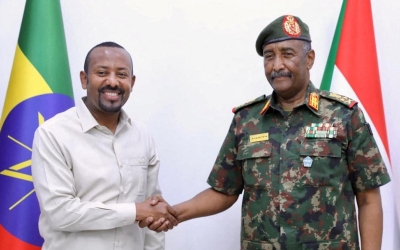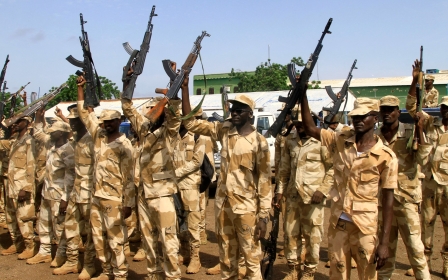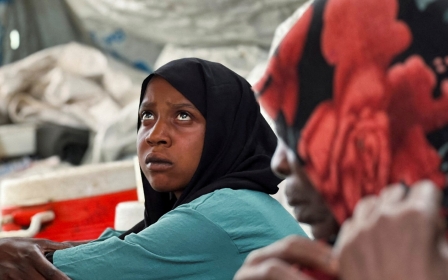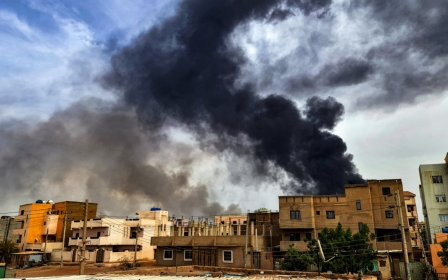Sudan army chief attacks 'regional players' in veiled reference to UAE
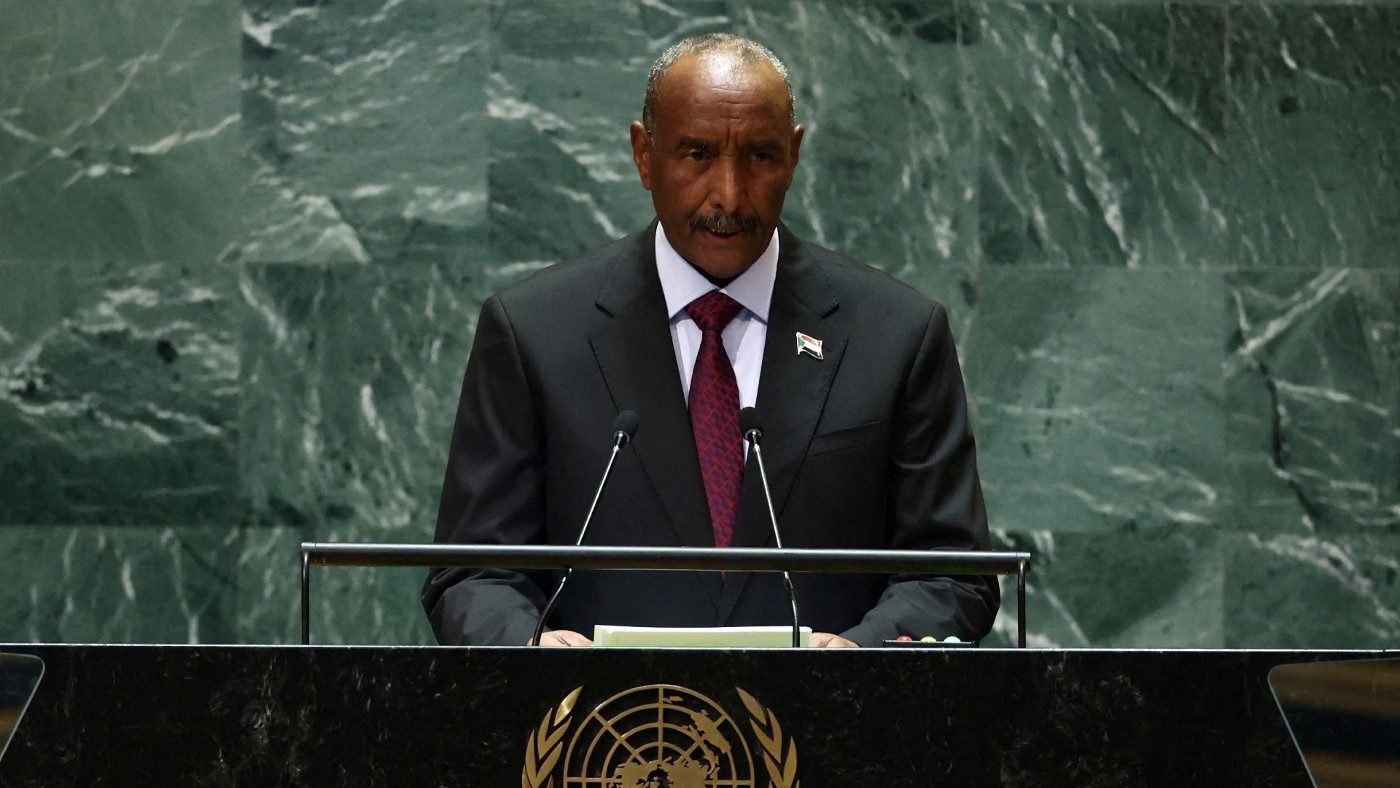
In a series of thinly veiled references to the United Arab Emirates, Sudanese army chief General Abdel Fattah al-Burhan attacked the “regional and political players” backing the paramilitary Rapid Support Forces (RSF) during an address to the UN General Assembly on Thursday.
Speaking as his army launched a major offensive to retake the Sudanese capital Khartoum, Burhan said that the RSF, which has been at war with the Sudanese Armed Forces (SAF) since April last year, was “receiving political and logistical support at the local and regional levels”.
He said that without this support, which came from states that would like “to control our people’s riches through the use of force and specifically through the use of money”, the war in Sudan would have ended.
Middle East Eye has reported extensively on the UAE’s patronage of the RSF, which is led by Mohamed Hamdan Dagalo, the general and former Janjaweed leader better known as Hemeti.
At a press conference after his speech, Burhan said that UAE ruler Mohammed bin Zayed had promised “to reconsider the situation” in a phone call the two men had in July. He would give no further details beyond that.
New MEE newsletter: Jerusalem Dispatch
Sign up to get the latest insights and analysis on Israel-Palestine, alongside Turkey Unpacked and other MEE newsletters
The army general, who is Sudan’s de facto head of state, said that it was “most unfortunate” that the RSF was “receiving the support of some states in the region, states which are providing funding and mercenaries for their own political and economic benefit”.
Sudan’s army-aligned government has previously presented the UN with evidence of the UAE’s support for the RSF, including the alleged presence of Emirati forces on the ground in Sudan.
The UAE continues to publicly deny that it is supporting the paramilitary. The Sudanese army has recently turned to Russia and Iran for help fighting the RSF.
Advances on Khartoum
In its largest operation since the war began, the Sudanese army launched a major offensive from Omdurman against RSF positions in Khartoum before dawn yesterday, seizing two bridges in the capital and triggering fierce fighting as the RSF tried to contain the advance and drive the attackers into the Nile, according to the Sudan War Monitor.
An RSF source told MEE the army had not taken the bridges and that they had lost officers and soldiers in the offensive.
Eyewitnesses in Khartoum said that on Friday the army was still advancing in the city and that its planes were bombing the strategically vital al-Jili oil refinery on the outskirts of the capital.
Meanwhile the RSF siege of el-Fasher, the capital of North Darfur, continues, with over a million civilians trapped as the army engages in a desperate defence of the last city it holds in Darfur.
Campaigners have previously told MEE that Darfur faces its own “Srebrenica” in el-Fasher, given the risk that the RSF could once more carry out civilian massacres.
Aid workers in the region told MEE famine had hit Zamzam camp, 15 km from el-Fasher, and that “several other areas” in and near to the city were close to famine.
At his press conference in New York, Burhan denied the level of suffering in Sudan, referring to a “food gap” and insisting that it “hadn’t reached the level of famine yet”.
During his speech, he piled blame for the country’s misery on the RSF, which he said had been engaging in “ethnic cleansing, forced displacement and genocide”.
He said the paramilitary force, which grew out of Darfur’s notorious Janjaweed militias and was incorporated into the Sudanese state by former autocrat Omar al-Bashir in 2013, should be “considered a terrorist group”.
In April this year, the Raoul Wallenberg Centre said there was “clear and compelling evidence” that the RSF was committing genocide against “non-Arab groups” in Darfur, the vast western region of Sudan that serves as the RSF’s powerbase.
Burhan told the UN that RSF fighters had sold women and children in marketplaces. Multiple eyewitnesses and aid workers have told MEE that RSF fighters have raped women throughout the war.
Burhan said the Dagalo family – Hemeti’s brother Abdul Rahim is the deputy leader of the RSF and other members of the family are involved in its operations and commercial ventures, which include the export of gold from RSF-controlled mines in Darfur – had been “violating all laws and international obligations with impunity”.
No peace in sight
In New York, the chance to make diplomatic headway appears to have been squandered. With Mohammed bin Zayed and the leaders of the G7 countries – all of whom say they want a ceasefire – present, some progress was hoped for.
US President Joe Biden is said to have raised the issue of UAE arms supplies with Mohammed bin Zayed when he met the Emirati leader, but Abu Dhabi continues to deny its involvement.
Patrick Smith, editor of Africa Confidential, told MEE that reporters at Burhan’s press conference were left baffled when he set out a raft of conditions to be met in order to restore peace, having first insisted that “we are keen on stopping the war and restoring peace and security, without any preconditions”.
Burhan said he would never sit down for talks with Hemeti - “unless he pulls his forces out and implements what we agreed to”.
During his address, Burhan said the army was “upholding commitments undertaken as part of the glorious 2019 revolution”, which was reversed in October 2021 when he and Hemeti took back full control of Sudan for the military.
Long accused of seeking to restore the power and influence of Sudan’s Islamic movement and its allies in the former administration of Bashir, Burhan claimed that the army would “never accept a return to the previous regime, which was rejected by the Sudanese people”.
Raging for almost 18 months, the war in Sudan has displaced over ten million people and left tens of thousands – maybe more – dead. Cholera and other diseases have broken out, with the UN saying almost 25 million people need assistance.
Middle East Eye delivers independent and unrivalled coverage and analysis of the Middle East, North Africa and beyond. To learn more about republishing this content and the associated fees, please fill out this form. More about MEE can be found here.


